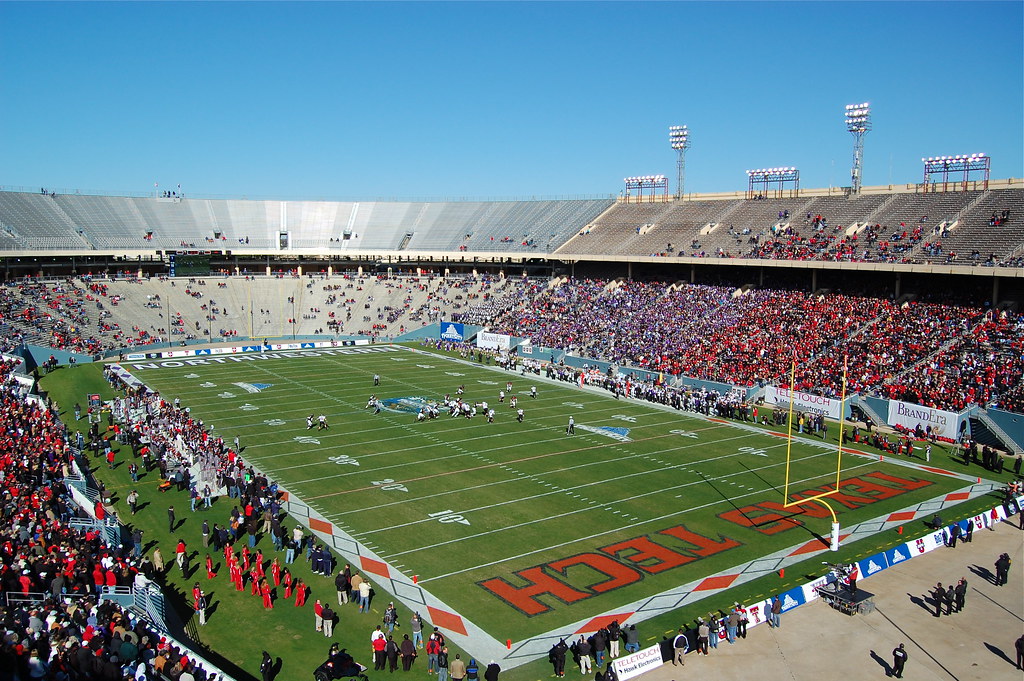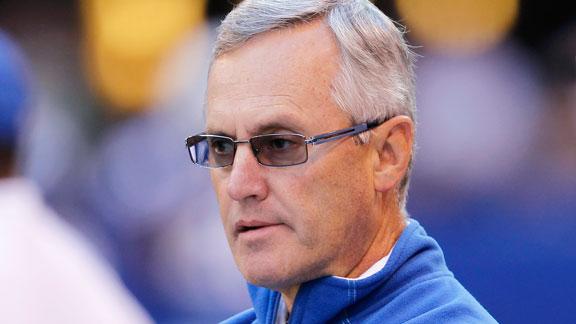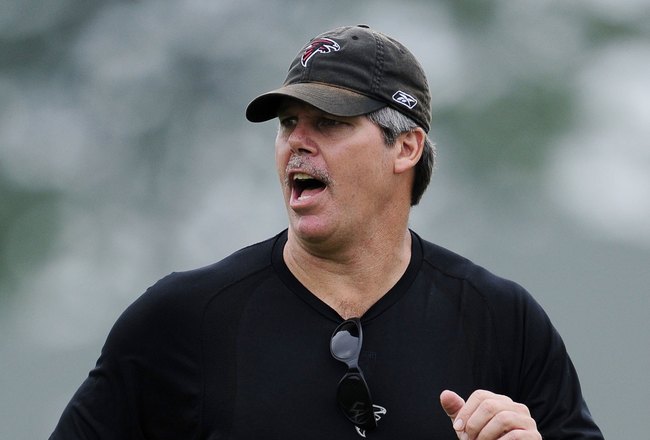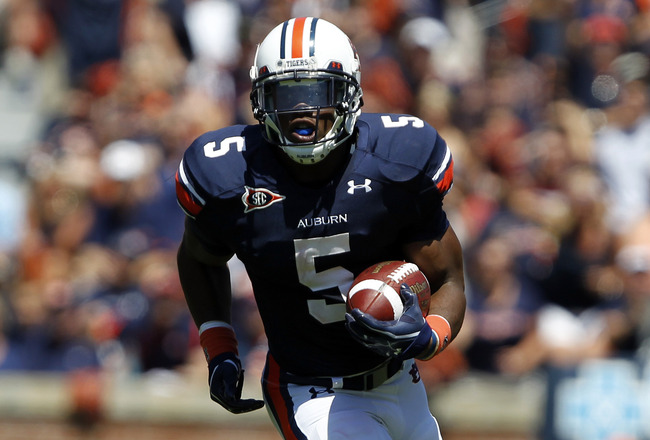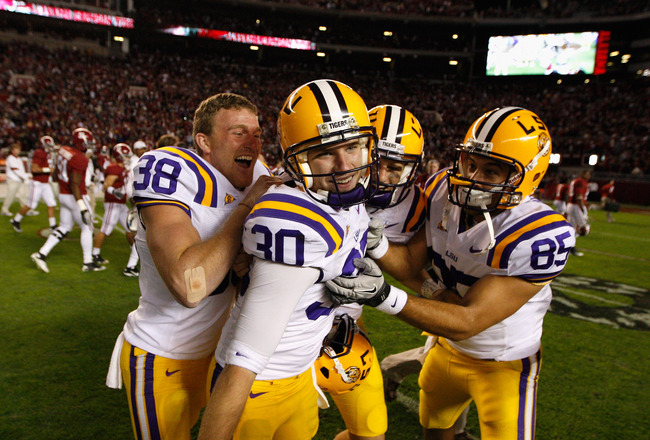 Warning: This is a more about journalism than it is about college football. Adjust your expectations accordingly.
Warning: This is a more about journalism than it is about college football. Adjust your expectations accordingly.The formative years of my adult life were spent working at a newspaper. I have a certain anal-ness that both contributed to and was exacerbated by being employed by a paper. Before stumbling into a job on the copy desk at a time when I really needed a job, I had never put much thought into the way news gets collected and distributed. It wasn't so much that I didn't know -- it's not very complicated -- it was just that I didn't even consider it, kind of like how you sit on your couch every day but never consider exactly how it was built.
Most of what I learned is now irrelevant for the same reason that I no longer work at a newspaper: They're dying a not-that-slow-but-very-painful death. I could literally write 10,000 words about why that's the case, but I have other plans today and instead will go with the simplest and most succinct explanation I've seen yet:
For some time now, newspaper people have been insisting, sometimes angrily, that we readers will soon have to pay for content (an assertion that had already appeared, in just that form, by 1996.) During that same period, freely available content grew ten-thousand-fold, while buyers didn’t. In fact, as Paul Graham has pointed out, “Consumers never really were paying for content, and publishers weren’t really selling it either. ... Almost every form of publishing has been organized as if the medium was what they were selling, and the content was irrelevant.”That's from Clay Shirky. If you don't know who Clay Shirky is, I highly recommend reading some of this stuff. He's one of the few people out there with enough of an understanding of web development and the accompanying societal changes to grasp exactly what's happening in news distribution.
... The curious thing about the various plans hatched in the ’90s is that they were, at base, all the same plan: “Here’s how we’re going to preserve the old forms of organization in a world of cheap perfect copies!” The details differed, but the core assumption behind all imagined outcomes (save the unthinkable one) was that the organizational form of the newspaper, as a general-purpose vehicle for publishing a variety of news and opinion, was basically sound, and only needed a digital facelift. As a result, the conversation has degenerated into the enthusiastic grasping at straws, pursued by skeptical responses.
Round and round this goes, with the people committed to saving newspapers demanding to know “If the old model is broken, what will work in its place?” To which the answer is: Nothing. Nothing will work. There is no general model for newspapers to replace the one the internet just broke.
It makes increasingly less sense even to talk about a publishing industry, because the core problem publishing solves — the incredible difficulty, complexity, and expense of making something available to the public — has stopped being a problem.
Long story short, major news organizations have not done particularly well at figuring out how to create and distribute news (I use that term loosely) that's appealing enough to draw in sufficient regular readers to make money. That's mostly because there are very few people who really care about news (in the literal sense). Here's another insightful paragraph:
There has never been a mass market for good journalism in this country. What there used to be was a mass market for print ads, coupled with a mass market for a physical bundle of entertainment, opinion, and information; these were tied to an institutional agreement to subsidize a modicum of real journalism.For obvious reasons, a lot of old-school writers are having a hard time with this. Rather than coming up with more analytical material that would actually be of value to a hardcore readership, their solution has been to make everything instant on the assumption that instant = interesting. I know a few people like this.
There was a story a while back -- I think it was by Joe Posnaski but unfortunately can't find it now -- about how baseball beat writers have become laughably competitive with trying to be the first to tweet the lineup card. This is of some value to huge (insert team here) fans, but here's the thing: Does anybody care who's first? If I'm a Tigers fan and follow the beat writers for MLive and the Free Press and maybe the Tigers' official site, I'm gonna get three tweets/Facebook posts with the updated lineup within a span of a couple minutes. Which was first makes no difference to me as long as I get the information. And if I'm a casual fan who only follows one of those entities, I have no way of knowing who was first since I don't get to see the others for reference.
An exclusive story (not just raw information) is valuable and worth breaking since it'll have a little staying power and can't be instantly replicated. Breaking information is ephemeral; as soon as one person reports it, everybody has it, and at that point it doesn't really matter who was first because everybody's moving on to the "what it means" analysis part. Digging to find information is still a good thing if it's the only way it's gonna be made public, but digging to get a scoop on something that's going to become publicly available five minutes after you report it isn't worth the effort.
You might be wondering where I'm going with this. Here it is:

Adam Jacobi was fired Friday by CBS Sports. Jacobi was the founder of awesome Iowa blog Black Heart Gold Pants and did well enough that he got hired for a full-time gig at CBS a couple months ago (he had been a regular contributor for a while). He is no longer employed because of this nine-word post that went up at 8:57 p.m. on January 21:
Joe Paterno has died at the age of 85.Joe Paterno was not actually dead; he departed early the next morning. Given that there were all kinds of reports flying around about the Paterno family being summoned to the hospital and the family talking about taking him off life support, distributing some mistaken/incorrect information would have been somewhat understandable even if extremely awkward given the content matter.
The problem was the explanation and what it said about CBS Sports' methods:
Penn State student website Onward State has reported that Penn State players were notified of longtime head coach Joe Paterno's passing via email, and CBSSports.com went on this report.The official apology was more of the same:
Earlier Saturday night, CBSSports.com published an unsubstantiated report that former Penn State coach Joe Paterno had died. That mistake was the result of a failure to verify the original report. CBSSports.com holds itself to high journalistic standards, and in this circumstance tonight, we fell well short of those expectations.Onward State was widely regarded as the originator of the death-confirmation email, which turned out to be a hoax (the editor resigned like an hour later), so the explanation and apology were probably accurate in that regard. Jacobi actually went back and updated the story to match the explanation just to cover his ass (the evidence is in the picture at the top of this post).
CBSSports.com extends its profound and sincere apology to the Paterno family and the Penn State community during their difficult time.
The problem: If CBS was explicitly taking a breaking story from Onward State, why was there no citation in the first post? You can't just take an unsubstantiated report and report it as fact with no independent verification and no citation. That's just stealing. As far as I'm concerned, that's a far worse transgression than being wrong based on inaccurate-but-believable information.
Had the first post been cited as "based on an email received by Onward State," or something along those lines, pretty much the whole thing would have fallen on the original entity. CBS Sports' only liability would be the decision to republish that information without verification, but since Onward State truly believed it had received an administrative email with information regarding Paterno's death, that's a decent source. It'd have been a borderline editorial decision on a touchy subject, but those happen thousands of times a day and rarely result in people being fired or major news organizations being told "you're wrong" about somebody's death.
Jacobi wanted to have the official story (by which I mean the CBS/ESPN/FOX Sports/Yahoo/Associated Press story) first for the benefit of himself and/or his employer. This is why:
CBS's apology rings hollow because it would never have linked that original report if multiple outlets had verified the death rapidly.Boom. Google rules all. Get the info out there "first" among the major entities, start collecting the hits (and accompanying ad revenue) and then adjust for accuracy later. It's the Twitter-fication of news.
Why?
Because CBS Sports was engaged in a clear and blatant Internet sport -- search whoring.
Search whoring has taken over an awful lot of sports media -- and the Internet at large -- in the modern era. If you climb to the top of Google's search results for "Joe Paterno death" millions of people will click on your article both immediately and for years to come. Plus, you slingshot to the top of the Google News results which brings millions more hits and also serves to supplement, you guessed it, your Google search standing.
People ask, why rush to be first with a death report?
And the answer is easy. Because being first -- even if your reporting isn't original in the least, which CBS's wasn't here -- makes it rain pageviews.
Jacobi understands this. Like I mentioned, he made a name for himself by building up BHGP; he wasn't a 30-year beat writer who got thrown into the online world and told to write some stuff. I'm pretty sure he grasps the basic workings of search engines and the power of an online brand like CBS Sports. Stealing the Onward State report was not a mistake in that regard; it was a mistake in judgment only.
I love stuff Jacobi produces and therefore hope he finds a place to get back into the interwebs world in some meaningful capacity. That said, he deserved to be fired. He deserved to be fired not because he didn't verify a plausible report from a borderline source but because he stole information from that source and passed it off as an independent statement of fact.
The worst part is that he didn't even need to do it. Had the original report been accurate, it'd have been confirmed within an hour and every major news source would've had a real obit up immediately. The monopoly on "Joe Paterno death" searches wouldn't have even lasted long enough to have a worthwhile effect on a high-traffic site like CBS Sports. How do I know this? I just did a Google search for "Joe Paterno death" and got the following results:
1. Huffington Post
2. Huffington Post (guh)
3. FOXSports.com
4. CBS Sports
Considering the typical traffic levels for CBS Sports and the fact that ABC News, the L.A. Times and the New York Times were all in the top 10 without jumping the proverbial gun by 12 hours, I doubt doing so was worth more than three or four spots on the list. The irony is that the oops-related controversy has probably resulted in way more eyeballs on that page than the original report did before the Paternos came out and said "false."
And Jacobi put his job on the line for it anyway. I'm guessing he learned his lessons here, and by "lessons" I mean (a) if you're gonna report the death of a celebrity, you better either verify the hell out of it or wait for confirmation and (b) if you're gonna steal information, don't steal information that could turn out to be so humiliatingly wrong that it results in your firing/journalistic blackballing.

